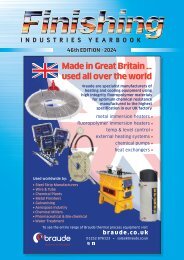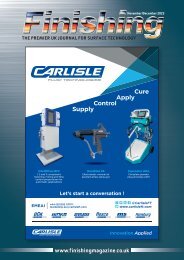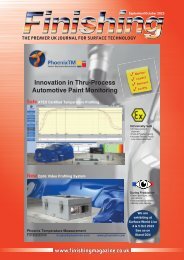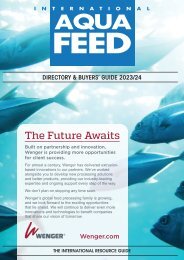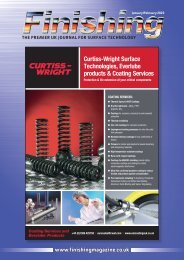Finishing - July-August 2022
This issue has the winners of the galvanizing industry awards, plus an update on the new Carlisle innovation centre. There is also a report from the BCF conference and a review of the Qualicoat conference with took place in London a few weeks ago. It’s great to see that in person events are taking place and that people are excited to go. Long may this continue!
This issue has the winners of the galvanizing industry awards, plus an update on the new Carlisle innovation centre. There is also a report from the BCF conference and a review of the Qualicoat conference with took place in London a few weeks ago. It’s great to see that in person events are taking place and that people are excited to go. Long may this continue!
Create successful ePaper yourself
Turn your PDF publications into a flip-book with our unique Google optimized e-Paper software.
34 PLATING<br />
Electrolysis as a component of<br />
renewable, electricity-based<br />
hydrogen production<br />
Power-to-gas is the conversion of electrical<br />
energy into gas and refers to the chemical<br />
process for producing (fuel) gas from water.<br />
The conversion process takes place through<br />
water electrolysis and a partially downstream<br />
methanation process. The resulting fuel gas is<br />
then stored and can be used in a variety of<br />
ways. Producing hydrogen by means of<br />
electrolysis is thus a pivotal step in the<br />
transformation between the electrical energy<br />
system and the downstream sectors of<br />
application. The use of power-to-gas<br />
technology makes particular ecological sense if<br />
electricity from renewable sources, such as<br />
solar or wind power, can be used to produce<br />
the gas.<br />
How water electrolysis works<br />
Hydrogen is a component of water and<br />
nearly all organic compounds. It is the most<br />
common chemical element and therefore very<br />
abundant. Hydrogen has the chemical formula<br />
H and is usually gaseous and lighter than air.<br />
However, hydrogen only occurs in nature in<br />
compound form, for example as a component<br />
of water. In order to use it as a source of<br />
energy, gaseous hydrogen must first be<br />
extracted from water or methane, e.g. by<br />
means of electrolysis. Electrolysis utilises<br />
electricity supplied via electrodes to separate<br />
water into its two components, oxygen and<br />
hydrogen. In the process, two water molecules<br />
are split into two hydrogen molecules and one<br />
oxygen molecule. The resulting hydrogen is<br />
then methanised through the addition of<br />
carbon dioxide. It can then be fed into the<br />
natural gas grid, for example ("further<br />
processing" of the hydrogen).<br />
Role of surface technology<br />
Apart from research and development,<br />
engineering services and plant construction,<br />
surface technology is also playing a vital role<br />
in making hydrogen-based technologies fit for<br />
the future. By developing the corresponding<br />
functional layers, surface technology can<br />
provide the parts and components used in<br />
hydrogen technology with new properties –<br />
such as adding protective functions that make<br />
them more durable, effective and efficient.<br />
Plating options for hydrogen<br />
technology<br />
The Holzapfel Group can plate the<br />
components used in electrode packages, such<br />
as anodes, cathodes, separator plates and end<br />
plates, but also cell frames and water-bearing<br />
components, with a functional layer that<br />
protects them from corrosion. Components up<br />
to a size of 2300 x 2100 mm can be plated<br />
for use in alkaline water electrolysis. Other<br />
processes such as electroless nickel, nickel<br />
sulphamate, electroplated nickel, silver, tin,<br />
zinc-nickel and other coating combinations are<br />
also available.<br />
First and foremost, it is necessary to plate<br />
the various components in order to ensure the<br />
durability and service life of the entire system.<br />
Applying a corrosion protection layer can<br />
make the parts considerably more resilient and<br />
a crucial reason is the improvement the<br />
plating brings in terms of efficiency. From a<br />
mechanical point of view, this treatment<br />
ensures the electrode packages deliver optimal<br />
performance. Compared to nickel plating, the<br />
Holzapfel Group's processes ensure<br />
significantly greater efficiency and thus a more<br />
economical mode of operation due to their<br />
lower energy consumption.<br />
Moreover, the Holzapfel Group develops,<br />
produces and assembles complete, customised<br />
electrode packages with gas-tight, materially<br />
bonded connections.<br />
Automated Water & Effluent Ltd have been supplying process control equipment<br />
to the metal finishing and surface finishing industry.<br />
We have an in-house team of qualified engineers able to design and build<br />
control panels and process equipment specific to fit your requirements.<br />
A wide range of our control instrumentation, dosing pumps and chemical process<br />
equipment is available on short delivery.<br />
CALL<br />
TODAY ON<br />
01785 254 597<br />
• Custom Designed & Built Control Panels<br />
• pH & Redox Controllers & Electrodes<br />
• Conductivity Controllers<br />
• Liquid Level Controllers<br />
• Open Chanel & Magnetic Flow Meters<br />
• Data Loggers<br />
• Dosing Pumps & Tanks<br />
Automated Water<br />
& Effluent Ltd<br />
Get in touch for a quote today!<br />
<strong>Finishing</strong> – <strong>July</strong>/<strong>August</strong> <strong>2022</strong><br />
AWE House, Antom Court, Tollgate<br />
Industrial Estate, Stafford, ST16 3AF<br />
awe-ltd.co.uk 01785 254 597






